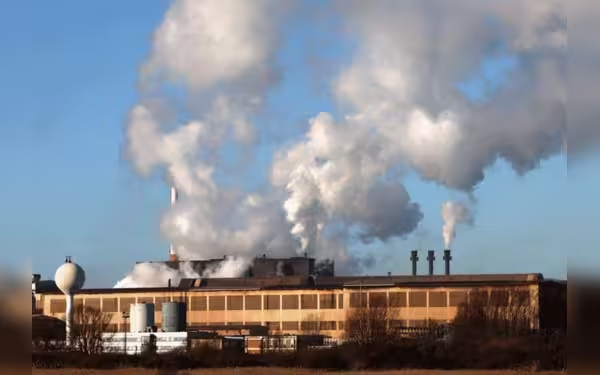Saturday, October 5, 2024 10:29 PM
Pakistan's Energy Dilemma: Balancing Fossil Fuels and Climate Commitments
- Pakistan faces energy crisis amid global fossil fuel restrictions.
- Technological solutions needed for affordable energy without climate harm.
- Coal gasification presents challenges and high costs for Pakistan.
 Image Credits: brecorder
Image Credits: brecorderPakistan grapples with energy needs and climate commitments, seeking affordable solutions amid global fossil fuel restrictions.
Pakistan is currently grappling with a significant energy dilemma. The country is in dire need of affordable energy, which could potentially be sourced from its indigenous resources, particularly Thar coal. However, international commitments and obligations are placing restrictions on the expansion of fossil fuels, including coal, in Pakistan's energy mix due to their harmful effects on climate change.
At a recent study launch regarding the government's initiative to convert Thar coal into gas, former Minister for Climate Change, Malik Amin Aslam, emphasized the urgent need for a technological solution that can generate inexpensive energy without exacerbating climate issues. He stated, "To get rid of this dilemma, we need to find the best technological solution – one that can produce cheap energy without hurting the climate – and complement it with the best nature-based solution to get rid of the carbon we produce during industrial processes such as power generation." However, Aslam pointed out that both technological and nature-based solutions require substantial financial investment, which Pakistan currently lacks.
Aslam further explained that the necessary funding could only come from developed nations or international financial institutions. He warned, "In the absence of this money, Pakistan will have to use whatever resources it has to provide affordable energy to Pakistanis regardless of the climatic impact of these resources." This statement underscores the pressing need for financial support to navigate the energy crisis while adhering to climate commitments.
Ali Tauqeer Sheikh, a prominent environmental activist and climate change expert, also addressed the audience, asserting that all energy-related decisions in Pakistan must align with the country’s nationally determined contributions under the Paris Agreement. He argued that energy policies should not only help Pakistan meet its international obligations but also consider the concerns of communities adversely affected by these policies.
The study conducted by the Policy Research Institute for Equitable Development (PRIED), in collaboration with the National University of Science and Technology (NUST), revealed that coal gasification presents fewer environmental and climatic impacts compared to direct coal burning. However, the costs associated with coal gasification are prohibitively high for Pakistan, and the technology is complex to implement effectively. Manzoor Ahmed Alizai, a researcher at PRIED, noted, "That is why several coal gasification projects have either failed or they have been shelved across the world including in the United States."
Dr. Majid Ali, a NUST educator and lead author of the study, highlighted that while coal gasification may be a better alternative to direct coal burning, it cannot compete with solar energy when considering both energy prices and environmental factors. Haneea Isaad, an energy finance expert, echoed this sentiment, pointing out that numerous coal gasification projects have failed spectacularly in countries like the United States, India, and Indonesia, even with substantial subsidies. She advised, "The government should look carefully into the alternatives before initiating any coal gasification projects in Pakistan."
Representatives from the Sindh Energy Department, Sindh Environment Protection Agency, and the Private Power and Infrastructure Development Board also participated in the discussion, alongside members of academia and civil society. The collective insights from these experts highlight the complexity of Pakistan's energy landscape and the urgent need for innovative solutions that balance economic needs with environmental responsibilities.
Pakistan stands at a crossroads in its energy journey. The challenge lies not only in securing affordable energy but also in fulfilling international climate commitments. As the nation seeks to navigate this intricate web of needs and obligations, it is imperative to explore sustainable alternatives that can provide energy security while safeguarding the environment. The future of Pakistan's energy policy will depend on the ability to innovate and adapt in the face of these pressing challenges.













